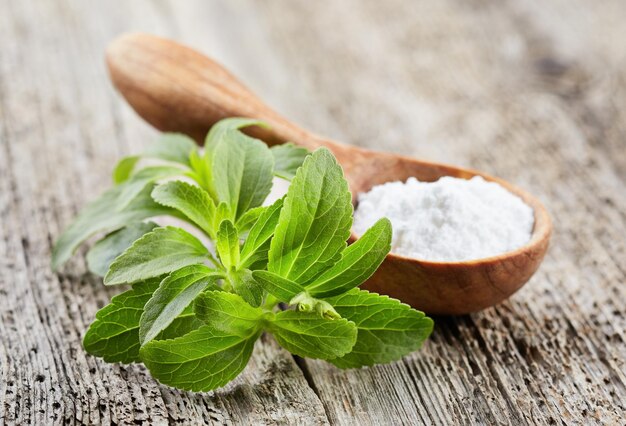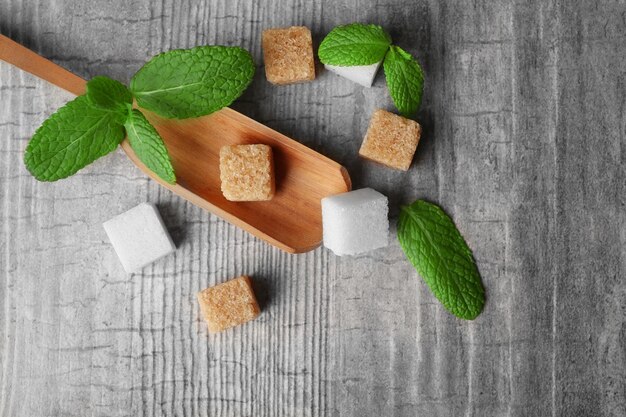Stevia, a natural sweetener, has gained popularity as a sugar substitute in recent years. Extracted from the leaves of the Stevia rebaudiana plant, it is known for its intense sweetness without the calories. But is stevia healthy? This question has sparked debates among health experts and consumers alike. While some tout its benefits for managing blood sugar and weight, others raise concerns about its safety and long-term effects. Let’s dive into what stevia is, its nutritional profile, and the health benefits it may offer.
What Is Stevia?
Stevia is a plant-based sweetener that comes from the Stevia rebaudiana plant, native to South America. It has been used for centuries by indigenous people as a sweetening agent and herbal remedy.
Origin and Extraction
- Stevia leaves contain compounds called steviol glycosides, which are responsible for their sweetness.
- These compounds are extracted and purified to produce stevia in forms suitable for consumption.
- Unlike artificial sweeteners, stevia is derived from a natural source, making it appealing to those seeking healthier alternatives.
Forms Available
- Stevia is sold in various forms, including powders, liquids, and tablets.
- It is often blended with other sweeteners or bulking agents to reduce its intense sweetness.
- Common brands include Truvia, PureVia, and SweetLeaf.
Nutritional Profile of Stevia
Stevia is prized for being calorie-free and suitable for those looking to cut down on sugar. Its unique nutritional properties make it stand out among sweeteners.
Caloric Content
- Unlike sugar, which contains 4 calories per gram, stevia has zero calories.
- This makes it an excellent option for weight management and calorie-conscious individuals.
Vitamins and Minerals
- Stevia itself does not provide significant amounts of vitamins or minerals.
- However, its lack of calories and carbohydrates makes it beneficial for individuals with dietary restrictions.
| Nutrient | Stevia (per 1g) | Sugar (per 1g) |
| Calories | 0 | 4 |
| Carbohydrates (g) | 0 | 1 |
| Glycemic Index | 0 | 65 |
Health Benefits of Stevia
Stevia offers a range of health benefits, particularly for those managing conditions like diabetes, hypertension, or obesity. Let’s explore these benefits in detail.

Blood Sugar Regulation
Stevia has a minimal impact on blood sugar levels, making it a safe choice for individuals with diabetes.
- How It Works: Steviol glycosides do not affect insulin secretion or glucose metabolism.
- Studies: Research shows that stevia can lower postprandial glucose levels in individuals with type 2 diabetes.
- Implications for Diabetes: By replacing sugar, stevia helps diabetics enjoy sweetened foods without worrying about blood sugar spikes.
Weight Management
As a zero-calorie sweetener, stevia plays a vital role in weight loss and maintenance.
- Calorie Savings: Replacing a single teaspoon of sugar with stevia saves about 16 calories.
- Appetite Control: Some studies suggest that stevia can reduce cravings for high-calorie foods.
- Research Support: A 2010 study published in the Appetite Journal found that stevia consumption led to reduced overall calorie intake.
Blood Pressure Reduction
Stevia may benefit individuals with hypertension by helping to lower blood pressure.
- Mechanisms: Certain compounds in stevia act as natural vasodilators, relaxing blood vessels.
- Evidence: A 2003 study in Planta Medica reported significant blood pressure reductions in hypertensive patients who consumed stevia extracts regularly.
- Additional Benefits: By improving blood flow, stevia may also reduce the risk of heart disease.
Dental Health
Unlike sugar, stevia is non-cariogenic, meaning it does not promote tooth decay.
- Cavity Prevention: Stevia does not ferment in the mouth, preventing acid production that damages enamel.
- Comparative Advantage: Studies have shown that replacing sugar with stevia significantly reduces the risk of cavities.
- Children’s Dental Care: Its safety and non-cariogenic properties make stevia an excellent choice for children.
Related to Read: Does Sweet Tea Have Caffeine?
Potential Side Effects and Concerns
While stevia is celebrated for its health benefits, it’s important to understand its potential side effects and limitations. Below are key concerns associated with its consumption.
Digestive Issues
Stevia can occasionally cause gastrointestinal discomfort.
- Reported Symptoms: Some individuals report bloating, gas, or nausea after consuming stevia. These reactions are often linked to overconsumption or sensitivity to certain stevia blends that include sugar alcohols like erythritol.
- Recommended Limits: To avoid these issues, stick to the recommended daily intake—typically no more than 4 mg of steviol glycosides per kilogram of body weight.
Allergic Reactions
Allergies to stevia are rare but can occur.
- Incidence: People with allergies to plants in the Asteraceae family (like ragweed or daisies) may be at higher risk.
- Symptoms: Reactions may include itching, rashes, or respiratory symptoms like wheezing. Severe cases are extremely rare.
- Management: If you experience symptoms, discontinue use immediately and consult a healthcare provider.
Blood Pressure Considerations
Stevia’s effects on blood pressure can be beneficial but may pose risks for certain individuals.
- Low Blood Pressure Risk: Stevia can further lower blood pressure in people already prone to hypotension.
- Medication Interactions: Individuals taking antihypertensive drugs should use caution, as stevia may amplify the effects of these medications. Consult your doctor before adding stevia to your diet if you have low blood pressure.
Hormonal Impacts
Concerns about stevia’s influence on hormones have emerged, though evidence is limited.
- Potential Effects: Some animal studies suggest stevia may affect hormone levels, particularly those related to reproductive health.
- Relevance to Humans: Human studies are inconclusive, but current evidence suggests that moderate consumption is unlikely to have significant hormonal effects.
Stevia vs. Other Sweeteners
Stevia is often compared with other sweeteners for its health benefits, taste, and safety profile. Let’s look at how it stacks up.

Stevia vs. Sugar
Stevia is vastly different from traditional sugar in several ways.
- Caloric Comparison: Stevia has zero calories, while sugar contains 4 calories per gram.
- Glycemic Index: Sugar has a high glycemic index (65), causing blood sugar spikes. Stevia, with a glycemic index of zero, has no such effect.
- Metabolic Health: Over time, replacing sugar with stevia can reduce the risk of obesity, diabetes, and heart disease.
Stevia vs. Artificial Sweeteners
Artificial sweeteners like aspartame and sucralose are common, but how do they compare to stevia?
- Safety Profiles: Stevia, as a natural product, is generally considered safer, with fewer long-term health concerns than artificial sweeteners.
- Regulation: Both stevia and artificial sweeteners are approved by regulatory agencies, but consumer trust in natural products often gives stevia an edge.
- Taste Differences: Stevia’s taste can sometimes be slightly bitter, while artificial sweeteners tend to mimic sugar more closely.
Stevia vs. Other Natural Sweeteners
Natural sweeteners like honey, agave nectar, and monk fruit also compete with stevia.
| Sweetener | Calories (per tsp) | Glycemic Index | Key Benefits | Drawbacks |
| Stevia | 0 | 0 | Zero-calorie, diabetes-friendly | Bitter aftertaste in some forms |
| Honey | 21 | 58 | Antioxidant-rich | High in calories and sugar |
| Agave Nectar | 21 | 15 | Low glycemic index | High fructose content |
Regulatory Status in the U.S.
The U.S. Food and Drug Administration (FDA) has specific guidelines for stevia products.
- Approved Forms: Highly purified steviol glycosides, such as rebaudioside A, are classified as “Generally Recognized as Safe” (GRAS).
- Restrictions: Raw or unprocessed stevia leaves and extracts are not approved for food use due to insufficient safety data.
- Consumer Safety: Stevia products meeting FDA standards are safe when consumed within recommended limits.
Related to Read: Is Intermittent Fasting Safe for Diabetics? 6 Proven Ways Backed by Science
Incorporating Stevia into Your Diet
Stevia can easily replace sugar in many recipes and beverages. Here are some tips to get started:
Tips for Substituting Sugar
- Use stevia in baking, but adjust for its intense sweetness—1 teaspoon of stevia is equivalent to 1 cup of sugar in sweetness.
- Try it in coffee, tea, smoothies, or homemade desserts.
Recommended Daily Intake
Stick to the acceptable daily intake (ADI) of 4 mg per kilogram of body weight. This ensures you enjoy the benefits without overconsumption.
Conclusion
Stevia is a natural, calorie-free sweetener with numerous health benefits, including blood sugar regulation, weight management, and improved dental health. However, potential side effects like digestive discomfort and interactions with medications highlight the importance of moderation. Comparing stevia with other sweeteners shows its versatility and health advantages, making it a great choice for many. Informed and moderate use ensures you can enjoy the benefits of stevia while minimizing risks.
FAQs
- Is stevia better than sugar for diabetes?
Yes, stevia does not raise blood sugar levels, making it ideal for diabetics.
- Can stevia cause bloating?
In some cases, overconsumption of stevia blends with sugar alcohols may lead to bloating.
- Is raw stevia safe to consume?
Raw stevia leaves are not FDA-approved for food use but are often used in herbal teas.
- How much stevia is too much?
Consuming more than the recommended daily intake of 4 mg per kilogram of body weight may lead to side effects.
- Can I use stevia in baking?
Yes, but remember that stevia is much sweeter than sugar, so use it sparingly.

